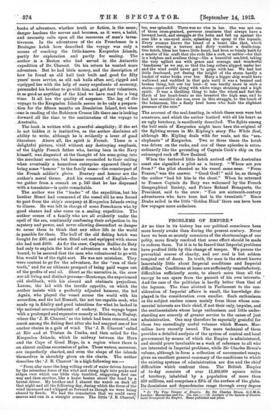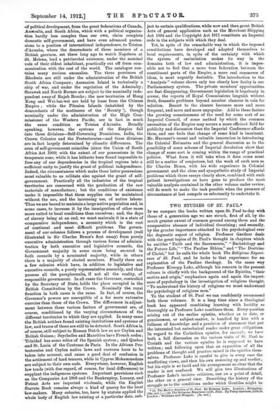PROBLEMS OF EMPIRE.* AT no time in its history has
our political conscience been more keenly awake than during 'the ,present century. Never have we been so acutely conscious of the shortcomings of our polity, more firmly resolved that some effort should be made to redeem them. Yet it is to be feared that Imperial problems have profited little by this change of temper. We pursue the proverbial course of charity, and our zeal is but seldom tempted out of doors. In truth, the man in the street knows lamentably little about Imperial conditions and Imperial difficulties. Conditions at home are sufficiently unsatisfactory, difficulties sufficiently acute, to absorb more than all the energy he can spare from the pursuit of his own interests. And the case of the politician is hardly better than that of the layman. The time allotted in Parliament to the con- sideration of Imperial affairs is small, the knowledge dis- played in the consideration even smaller. Such enthusiasm as the subject excites comes mainly from those whose com- mercial interests are their chief, if not their only, impulse, and the sentimentalists whose large enthusiasm and little under- standing are scarcely of greater service to the cause of just administration. One may therefore be especially grateful for these two exceedingly useful volumes which Messrs. Mac- millan have recently issued. The more technical of them provides a detailed analysis of the system of central and local government by means of which the Empire is administered, and should prove invaluable as a work of reference to all who are interested in Imperial problems, while Sir Charles Bruce's volume, although in form a collection of unconnected essays, gives an excellent general summary of the conditions to which the existing systems of administration are due and the chief difficulties which confront them. The British Empire of to-day consists of over 11,400,000 square miles of territory, inhabited by a population of more than 410 millions, and comprises a fifth of the surface of the globe. Its dominions and dependencies range through every degree
• (1) The True Temper _of Empire. By Sir Charles Bruce,. 0.0.11.0. London: Macmillan and Co. [5s. net.]—(2) Analysis of the System of Govern- ment throughout the Empire. Same publisher and price.
.of political development, from the great federations of Canada, Australia, and South Africa, which with a political organiza- tion hardly less complex than our own, claim complete -domestic self-government, and have even advanced preten- sions to a position of international independence, to Tristan ArAcunha, where the descendants of three members of a British garrison, set there long ago to watch Napoleon at St. Helena, lead a patriarchal existence, under the.nominal rule of their oldest inhabitant, practically out off from com- munication with the rest of the world. The catalogue con- tains many curious anomalies. The three provinces of Rhodesia are still under the administration of the British South Africa Company; Ascension Island is technically a ship of war, and under the regulation of the Admiralty; Sarawak and North Borneo are subject to the nominally jade- pendent sway of Rajah Brooke; the new territories of Hong Kong and Wei-hai-wei are held by lease front the Chinese _Empire ; while the Pitcairn Islands (inhabited by the -descendants of the mutineers of the 'Bounty '), though
• nominally under the administration of the High Com- missioner of the Western Pacific, are in fact in much the same condition as Tristan d'Acunha. Broadly .speaking, however, the systems of the Empire fall into three divisions—Self-Governing Dominions, India, the 'Crown Colonies and the Protectorates—and these divisions are in fact largely determined by climatic differences. The area of self-government coincides (since the Union of South Africa Act 1909) with the extent of our possessions in the temperate zone, while it has hitherto been found impossible to fuse any of our dependencies in the tropical regions into a sufficient unity to justify the grant of political independence. Indeed, the circumstances which make these latter possessions • enost valuable to us militate also against the grant of self- government. Practically all the industries of the tropical tterritories are concerned with the production of the raw materials of manufacture ; but the conditions of existence make it itztpossible that these supplies can be maintained 'without the use, and the increasing use, of native labour. 'Thus we are bound to maintain a large native population and, in some cases, to increase it by the immigration of other races more suited to local conditions than ourselves ; and, the days of slavery being at an end, we must maintain it in. a state of comparative independence, a necessity which is the root of continual and most difficult problems. The govern- anent of our colonies follows a process of development (well illustrated in Sir Charles Bruce's first essay) from purely 'executive administration through various forms of adminis- tration by both executive and legislative councils, the -Government majority in some cases being secured in loth councils by a nominated majority, while in others there is a majority of elected members. Finally there are a few colonies which have, in addition to legislative and executive councils, a purely representative assembly, and thus possess all the paraphernalia, if not all the reality, of responsible government. In all cases the Governor, controlled by the Secretary of State, holds the place occupied in the British Constitution by the Crown. Nominally the royal -function in both cases is the same. In fact, of course, the Governor's powers are susceptible of a far more extensive exercise than those of the Crown. The differences in adjust- ment between these various factors of government are, of course, conditioned by the varying circumstances of the different territories to which they are applied. In many cases the British settlers found existing institutions and systems of law, and traces of these are still to be detected. South Africa is, -of course, still subject to Roman Dutch law as are Ceylon and British Guiana; Seychelles and Mauritius have French codes; ' Trinidad has some relics of the Spanish system ; and Quebec and St. Lucia of the Coutume de Paris. In the African Pro- tectorates and Ceylon native laws and customs have to be taken into account, and cause a good deal of confusion in the settlement of land tenures, while in Cyprus Mohammedans are subject to their own code. Everywhere, however, English law tends (with due regard, of course, for local differences) to supplant the indigenous systems. Important provisions such as the Companies Act 1908 and the Bankruptcy, Lunacy, and patent Acts are imported wholesale, while the English Statute Book remains always a kind of quarry for the local taw-makers. Many colonies, too, have by statute applied the whole body of English law existing at a particular date, sub- ject to certain qualifications, while now and then great British Acts of general application such as the Merchant Shipping Act 1894 and the Copyright Act 1911 constitute an Imperial code in the subjects with which they deal.
Yet, in spite of the remarkable way in which the imposed constitutions have developed and adapted themselves to local requirements, in spite of the certainty with which the system of assimilation makes its way in the domains both of law and administration, it is impos- sible not to feel that a more true federation between the constituent parts of the Empire, a more real commerce of ideas, is most urgently desirable. The introduction to the " Analysis " volume shows only too clearly how faulty is our Parliamentary system. The private members' opportunities are fast disappearing, Government legislation is hopelessly in arrear, the reports of Royal Commissions languish without fruit, domestic problems beyond number clamour in vain for solution. Resort to the closure becomes more and more frequent, and more and more unpopular. Add to these factors the growing consciousness of the need for some sort of an Imperial Council, of some method by which the common necessities of the Empire may secure a more efficient field for publicity and discussion than the Imperial Conference affords them, and one feels that change of some kind is imminent. Mr. Harcourt's recent and valuable innovation in introducing the Colonial Estimates and the general discussion as to the possibility of some scheme of Imperial devolution show that change of some sort is coming within the range of practical politics. What form it will take when it does come must still be a matter of conjecture, but the work of such men as Sir Charles Bruce, with his wide experience in Colonial government and the close and sympathetic study of Imperial problems which these essays clearly show, combined with such patient investigations as have gone to produce the most valuable analysis contained in the other volume under review, will do much to make the task possible when the pressure of circumstance at last compels us reluctantly to undertake-it.







































 Previous page
Previous page